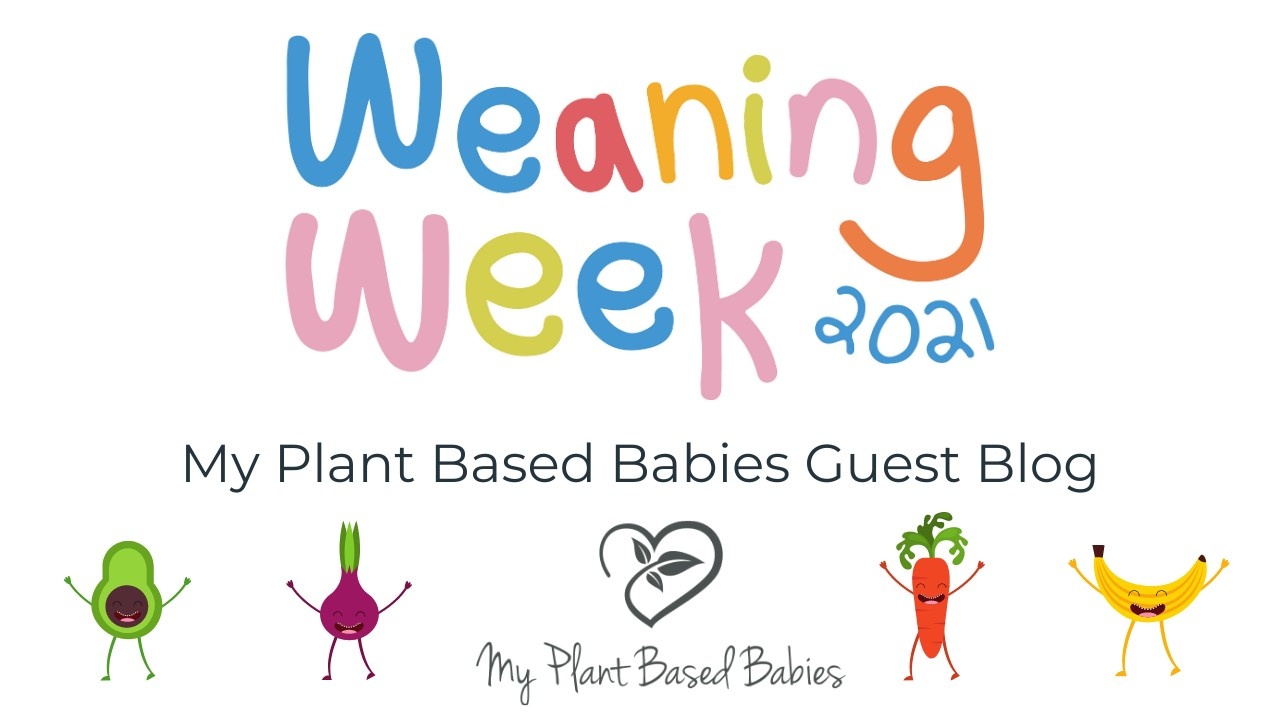
First published for Weaning Week 2021
Are you considering feeding your baby more plants and fewer or no animal products? Or maybe you are already plant-based but wondering what you need to consider for weaning your baby this way? In this guest blog, nutritionist Kieley Brooke explains why a plant-based diet is a good way to wean your baby, how it can be nutritious and help to reduce the risk of illness and disease. She also shares some simple swaps to get you started so you can feel confident in choosing a plant-based lifestyle for you and your little one.
Is a plant-based diet safe for my baby?
There are three major Dietetics organisations around the world who currently support a plant-based diet for all stages of life. This includes pregnancy, lactation and weaning your baby too. These are the British Dietetic Association, Dietitians of Canada and the Academy of Nutrition & Dietetics (USA). The most important message they provide is that a plant-based diet can fully support healthy living in people of all ages when it is well-planned. This may require some research to understand how to plan your baby’s diet effectively.
The food your baby eats in their first few years of life can impact the health of your child as they grow and enter adulthood. It can take decades for certain lifestyle diseases to develop but they can be directly associated with your child’s nutrition. Research shows that a plant-based diet can play a part in your baby having a healthy start in life. During the first 1,000 days of life, starting at conception until your baby’s second birthday, nutrition intake is of great importance to your baby’s ongoing and long term health. This is especially true for their brain development (read more about the first 1000 days in the link below). The great news is it is never too late to start introducing a healthy diet, but the earlier you begin the bigger the impact.
What can my baby eat?
A plant-based diet is incredibly varied, tasty, colourful and interesting for your little one when they are first starting solid food and beyond. It also has the benefit of being typically low in salt, sugar or additives which can be found in meat products (for example antibiotics and growth hormones).
A plant rich diet includes a wide variety of foods such as grains, lentils, tofu, beans, nuts and seeds, fruits and vegetables. It is also important to consider good sources of omega-3 fats such as flaxseeds, chia seeds and walnuts too, as well as incorporating some calcium containing foods such as plant-based yoghurt and milk (only to be offered in cooking) which often contain important added vitamins such as vitamin B-12 and Vitamin D. It is of course very important that all foods are safely prepared during weaning. For example, nuts may be offered ground, very finely chopped or as nut butter. Always check safe preparation before offering foods to your little one.
Easy plant-based swaps
Some simple ways to incorporate more plants and fewer animal products in your weaning journey include:
- Swap out your usual cows milk and dairy products with plant-based milk (used only in cooking under 1 year old) and dairy free yoghurts such as an unsweetened soya, coconut or oat yoghurts with meals.
- Switch out mincemeat in Bolognese or Chilli recipes with tinned brown lentils or black beans.
- Instead of an egg omelette, use gram flour (chickpea flour) to make a delicious frittata or mini gram omelette. Seasoned mashed tofu can also make a delicious substitute for scrambled eggs.
- Cheese can be replaced with nutritional yeast flakes which have a great cheesy flavour when added to pasta meals or into a homemade dairy free cheese sauce. Try it sprinkled onto fruit and veg to help your baby to grip (avocado, cucumber or banana are good examples).
Vitamins & Minerals
Breastmilk & infant formula milk continue to provide almost everything your baby requires up to the age of 12 months. There are a few exceptions such as iron. This important mineral is usually in plentiful supply in breastmilk and your baby’s own stores until around 4 – 6 months of age at which point it becomes important to offer iron rich food at the start of weaning. On a plant-based diet this can include dark green leafy vegetables, dried fruits (offered as puree as part of meals meals), tofu, lentils, iron fortified cereals such as ground porridge oats (Ready Brek or supermarket own brand) and some plant-based milk. Infant formula provides everything your baby requires while they are consuming over 500mls per day.
Continued breastfeeding will remain a fantastic nutritional support for your plant-based infant while they learn to confidently explore and eat these whole foods from the start of weaning and beyond, providing you are also taking care of yourself and consuming a healthy plant-based diet too. This should include taking a reliable plant-based supplement which will ensure essential vitamins and minerals continue to support your baby at this exciting time of rapid growth and development.
USEFUL LINKS:
Planning Well-Balanced Vegetarian Diets in Infants, Children, and Adolescents: The VegPlate Junior;
The first 1,000 days of life: The brain’s window of opportunity
Vegan Nutrition for Mothers and Children: Practical Tools for Healthcare Providers. L Baroni, S Goggi, R Battaglino, M Berveglieri, I Fasan, D Filippin, P Griffith, G Rizzo, C Tomasini, M Tosatti, M Battino, 2018
Eating well: vegan infants and under 5’s: First Steps Nutrition Trust, 2020

